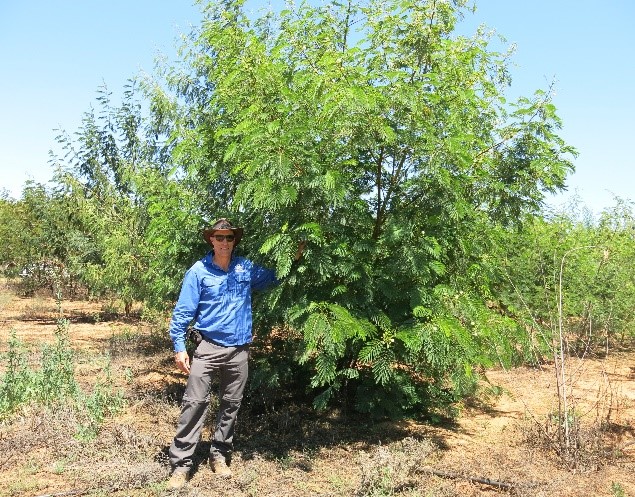Sterile leucaena on track to become a commercial reality

Trials of sterile leucaena hybrid plants in Carnarvon and Kununurra in Western Australia’s north are looking promising, with many plants having flowered but not produced any seed for two years.
The legume shrub leucaena is highly regarded as cattle fodder but is considered an environmental weed in many parts of Australia.
Since 2017, The Department of Primary Industries and Regional Development (DPIRD) WA and The University of Queensland, with support from Meat and Livestock Australia (MLA) Donor Company, has conducted breeding research to develop a leucaena variety without seeds (sterile) to reduce the weed risk to the environment.
A conventional (hand-crossing) breeding strategy was used by DPIRD to create the new lines and this utilised differences in the ploidy level (the number of chromosome sets in the cells of the plant) of different leucaena species.
Three leucaena species used in the breeding program have four sets of chromosomes referred to as tetraploids while another eight species have two sets of chromosomes called diploids. When a tetraploid species is crossed with a diploid, triploid progeny is created and is usually sterile or produces less viable seed.
The project has created hybrid leucaena lines using germplasm from the Australian Pastures Genebank in Adelaide, and from genebanks in the USA and Colombia, together with locally collected seeds from naturalised populations.
During 2018/19 and 2019/20, 2260 crosses between 45 different combinations of diploid and tetraploid species have created over 3000 potential triploid hybrid plants. These are growing across secure field sites at Carnarvon and Kununurra in WA under irrigation.
The project has assessed plants on whether they flower and produce viable seed and they will also be evaluated for other characteristics such as their feed quality, growth habit, plant chemistry and animal production. Many of these plants have been confirmed as sterile hybrids with some very productive plants identified that have flowered for an extended period but have not produced seeds.
Clonal micro-propagation appears to be a feasible strategy for mass production of sterile leucaena and the best plants will be assessed for their suitability to be propagated in this way. This five and a half year project runs until April 2023.
The research to date has just been published in the Crop and Pasture Science journal.